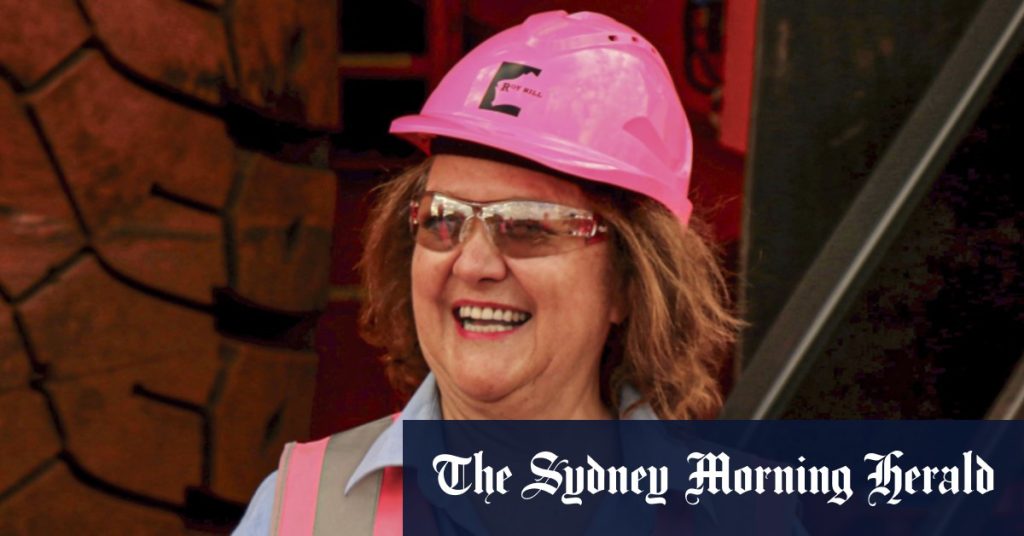Gina Rinehart, Australia’s wealthiest individual, has recently obtained approval for her latest iron ore project, the McPhee project, located in the Pilbara region of Western Australia. The project, expected to produce 10 million tonnes of ore annually starting next financial year, faced numerous challenges during its approval process, according to Hancock Prospecting’s projects chief executive Sanjiv Manchanda. Rinehart has used this approval as an opportunity to criticize what she perceives as overly burdensome environmental regulations that could deter investment in the mining sector and harm living standards in Australia. She warns that adding more government regulations and bureaucratic red tape could drive investment offshore to other countries, potentially leading to business closures and a decline in living standards across Australia.
Rinehart emphasized the importance of making investment and projects more welcoming in order to continue reaping the benefits of the mining industry and the businesses it supports. She believes that mining plays a crucial role in maintaining high living standards and economic prosperity, particularly in Western Australia where the industry has been a key driver of economic growth. Rinehart expressed concern about the impact of stringent environmental regulations on the mining sector, arguing that such measures could make projects more expensive and uncertain, ultimately discouraging investment and hindering economic development. She urged policymakers to strike a balance between environmental protection and fostering a conducive environment for mining investment and development.
The approval of the McPhee project comes on the heels of Rinehart’s successful development of the Roy Hill mine, showcasing her entrepreneurial skills and business acumen in the mining industry. With an estimated net worth of $46 billion, Rinehart has established herself as a prominent figure in Australia’s resources sector, leading Hancock Prospecting to become one of the country’s largest privately-owned companies. Her outspoken criticism of what she perceives as government overreach and excessive regulation reflects a broader sentiment within the mining industry, where stakeholders often clash with policymakers over environmental compliance and project approvals.
Rinehart’s comments underscore the ongoing debate surrounding the balance between environmental protection and economic development in Australia, particularly in resource-rich regions like the Pilbara. As one of the world’s largest exporters of iron ore, Australia relies heavily on mining revenue to drive economic growth and sustain high living standards. However, concerns about the environmental impact of mining activities have led to calls for stricter regulations and greater scrutiny of new projects. Rinehart’s warnings about the potential consequences of stifling investment in the mining sector highlight the delicate balance that policymakers must strike to ensure sustainable development while protecting the environment.
Despite the challenges facing the mining industry, Rinehart remains optimistic about the future of resource development in Australia, emphasizing the need to support investment and growth in key sectors like iron ore. By advocating for a more welcoming environment for mining projects, she seeks to preserve the industry’s contributions to the economy and maintain the high living standards that mining has helped to support in Australia. As the debate over environmental regulations and economic development continues, stakeholders from both sides will need to engage in constructive dialogue to find solutions that balance the competing interests of industry, government, and environmental protection.
In conclusion, Gina Rinehart’s approval of the McPhee project and her subsequent criticisms of government regulation in the mining sector highlight the ongoing challenges facing Australia’s resource industry. As a key player in the mining sector, Rinehart’s remarks shed light on the importance of ensuring a conducive environment for investment and development while addressing environmental concerns. With the mining industry playing a vital role in driving economic growth and maintaining living standards, finding a balance between economic development and environmental sustainability will be crucial for Australia’s future prosperity. By engaging in constructive dialogue and seeking common ground, stakeholders can work towards a more sustainable and prosperous future for the mining sector and the Australian economy as a whole.














